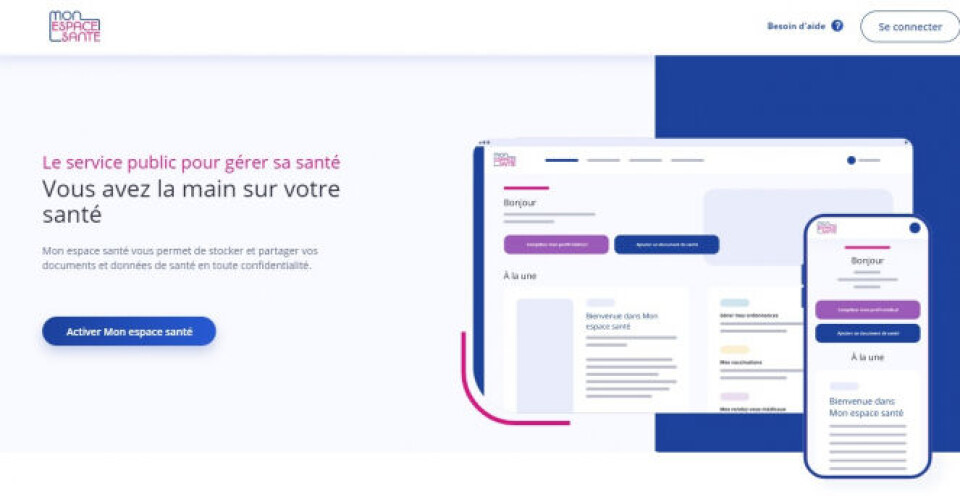-
Record river levels, more evacuations: Latest on flooding in south-west France
Alerts are in place across five departments and residents in some areas are told to stay home
-
French second-home visa issues raised in House of Lords
British people experience an "expensive and bureaucratic process" to continue living in France
-
More than 5,000 French communes use AI to identify poor rubbish sorting
Badly-sorted rubbish can cost millions so communes are turning to high-tech solutions
France is set to switch to digital prescriptions. How will it work?
The new system is part of a wider plan to digitise healthcare records and remove the risks and inconveniences associated with paper prescriptions

Article published May 18, 2023
The French government has launched a plan to digitise medical prescriptions.
It is part of a wider project that has already seen an online space created where patients in France can store and share medical records.
Here we look at how digital prescriptions will work.

Mon espace santé lets you see your medical records and share them with healthcare professionals securely. Picture credit: Monespacesante.fr
How will digital prescriptions work?
The intention is that doctors will be able to send prescriptions digitally and patients will be able to see them in their Mon espace santé online login area. The prescription will have its own QR code, to make it easily recognisable and usable.
Pharmacists will be able to scan a QR code and see all the details required.
Read also: France to trial digital driving licences as move online gathers pace
Why move to digital prescriptions?
The digital prescriptions will aim to:
- Remove any risks associated with pharmacists misreading (or not being able to read at all) doctors’ handwriting on prescriptions
- Avoid problems caused by lost or damaged paper prescriptions
- Keep a digital, central record of prescriptions and past medication
- Make it easier to store and request repeat prescriptions
Making the prescription part of the Mon espace santé will also remove the risks associated with sending prescriptions by other, unofficial digital means, such as via email.
Raphaël Beaufret and Hela Ghariani, managers of digital health at France’s health ministry, said: “A patient that has received a doctor’s prescription on their espace santé will be able to send it to their pharmacy securely. We are killing off Gmail.”
#NumériqueEnSanté | Pour élaborer la nouvelle feuille de route du numérique en santé 2023-2027, un tour des régions a eu lieu :
— Ministère de la Santé et de l'Accès aux soins (@Sante_Gouv) May 17, 2023
👉 Plus de 5 000 participants
👉 2 mois d'échanges dans 18 villes de #France
📽 Retour en vidéo sur les échanges ⤵ pic.twitter.com/I70kOnrSgE
Does France not already use digital prescriptions?
Until now, digital prescriptions have been the subject of several trials since 2019. But France’s public health insurance fund, the Assurance maladie, has said that as of September 2022, only 259 doctors and 59 pharmacists across a handful of departments have tested the tool.
Only one million prescriptions had been sent using this method in three years, it said.
Read also: How seeing a doctor in France will change after new health law adopted
What is the digital prescription roll-out timeline?
Now, health professionals have until mid-March next year to order and install software updates, if needed, to ensure the correct functioning of their computer systems to use the new prescription method via Mon espace santé.
The goal is that the transition from paper to digital prescriptions will now speed up considerably. By the end of 2024, 75% of doctors’ surgery computer systems must conform to the new rules.
France’s health minister, François Braun, is also aiming for 40,000 doctors to have written at least one digital prescription by then.
The new system is also set to help boost the use of Mon espace santé. Mr Braun said: “Currently, 10 million documents are added to the Mon espace santé per month. That’s about the same as the entire number [of documents] added between 2004 and the launch of the digital system.
“We have really changed gear,” he said, adding that he is aiming for 250 million documents to be put on the system before the end of 2023, and 400 million by the end of 2026.
Read also: Healthcare explainer: How France’s new e-carte Vitale will work
What about people who need digital help?
The minister acknowledged that some people may feel reluctant about prescriptions and more health services moving online.
This is an issue highlighted previously by the Défenseure des Droits, who has said that the digitisation of essential services without adequate support can constitute a violation of human rights and access to public providers.
Read more: Foreigners among the losers amid France’s ‘excessive digitisation’
Mr Braun has said that by June 2026, the government will recruit 10,000 mediators to help people with the transition to digital healthcare.
Related articles
Conditions of use set out for France’s healthcare e-carte Vitale app
New digital space rolled out in France to better manage health data
























